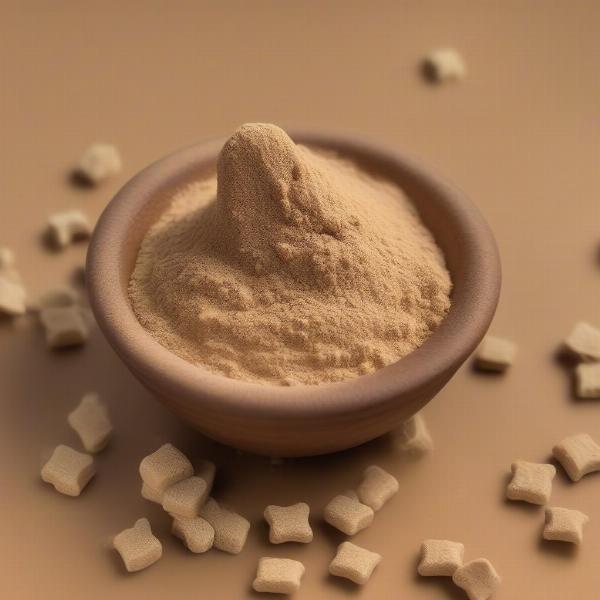Brewer’s yeast is a popular supplement for dogs, often touted for its potential benefits for skin, coat, and overall health. But what exactly is brewer’s yeast, and is it truly beneficial for your canine companion? This guide will delve into the uses, benefits, and potential risks of brewer’s yeast for dogs, providing you with the information you need to make informed decisions about your dog’s nutritional needs.
Understanding Brewer’s Yeast
Brewer’s yeast is a byproduct of beer production, derived from a single-celled fungus called Saccharomyces cerevisiae. This nutritional powerhouse is packed with B vitamins, including biotin, which is essential for healthy skin and coat. It’s also a good source of protein, chromium, and various minerals. While often associated with beer, brewer’s yeast used for supplementation is typically deactivated, meaning it doesn’t contain alcohol and won’t intoxicate your dog. There are different forms of brewer’s yeast, including powdered, liquid, and tablets, each with its own advantages and disadvantages.
 Brewer's yeast powder supplement for dogs
Brewer's yeast powder supplement for dogs
The Benefits of Brewer’s Yeast for Dogs
Many dog owners turn to brewer’s yeast for its potential to improve their dog’s skin and coat health. The high biotin content can help alleviate dry, flaky skin, reduce itching, and promote a shiny, healthy coat. Beyond skin and coat benefits, brewer’s yeast is also believed to support digestion, boost the immune system, and aid in the management of allergies and flea infestations. The B vitamins in brewer’s yeast play a vital role in energy production and nerve function, contributing to your dog’s overall well-being.
Is Brewer’s Yeast Safe for All Dogs?
While brewer’s yeast is generally considered safe for dogs, it’s important to consult with your veterinarian before adding any new supplements to your dog’s diet. Some dogs may experience digestive upset, such as gas or diarrhea, particularly when starting brewer’s yeast. It’s best to introduce it gradually, starting with a small amount and increasing it slowly as tolerated.
Choosing the Right Brewer’s Yeast for Your Dog
When selecting a brewer’s yeast supplement, opt for products specifically formulated for dogs. Avoid using brewer’s yeast intended for human consumption, as it may contain additives that are harmful to dogs. Look for products that are free from artificial flavors, colors, and preservatives. brewer’s yeast and dogs provides further information on selecting appropriate supplements.
Dosage and Administration
The appropriate dosage of brewer’s yeast for dogs varies depending on factors such as size, age, and overall health. It’s crucial to follow the instructions on the product label or consult with your veterinarian for personalized guidance. dogs and brewers yeast offers more detailed information on dosage guidelines.
Brewer’s Yeast: A Valuable Addition to Your Dog’s Diet?
Brewer’s yeast can be a valuable addition to your dog’s diet, offering potential benefits for skin, coat, and overall health. By understanding its uses, benefits, and potential risks, you can make informed decisions about whether brewer’s yeast is the right choice for your furry friend. Remember to always consult with your veterinarian before adding any new supplement to your dog’s diet. biotin for dogs explores the importance of biotin in a dog’s diet, and skin & coat supplements for dogs provides a wider overview of supplements that can support healthy skin and coat.
FAQ
- Is brewer’s yeast the same as nutritional yeast? No, while both are derived from Saccharomyces cerevisiae, they are processed differently. Nutritional yeast has a deactivated bitter taste, while brewer’s yeast retains a bitter flavor.
- Can brewer’s yeast help with flea control? Some believe the B vitamins in brewer’s yeast can make dogs less appealing to fleas, but this hasn’t been scientifically proven.
- How long does it take to see results from brewer’s yeast? It may take several weeks of consistent supplementation to notice improvements in skin and coat health.
- Can I give my dog beer instead of brewer’s yeast? No, never give your dog beer. Alcohol is toxic to dogs and can have serious health consequences.
- What are the signs of a brewer’s yeast allergy in dogs? Allergic reactions are rare but can include itching, hives, and difficulty breathing.
- Can puppies take brewer’s yeast? Consult your veterinarian before giving brewer’s yeast to a puppy.
- Where can I purchase brewer’s yeast for my dog? Brewer’s yeast supplements formulated for dogs are available at pet stores, online retailers, and some veterinary clinics.
ILM Dog is a leading international online resource dedicated to providing dog owners with expert advice and information on all aspects of dog care, from breed selection and health to training and nutrition. We are committed to empowering dog owners with the knowledge they need to provide the best possible care for their canine companions. For expert advice on dog nutrition and a wide range of dog products and accessories, visit ILM Dog or contact us at [email protected] or +44 20-3965-8624.